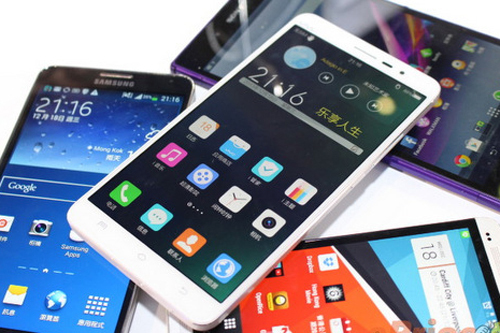(单词翻译:单击)
Alibaba Group announced Monday that it invested $590 million in one of China’s lesser-known smartphone makers, Meizu, a company with small market share but a long history as one of the country’s smartest device makers. In the 2000s it turned out popular Mp3 players and one of China’s first smartphones it called an iPhone-killer.
阿里巴巴集团周一宣布,对魅族投资5.9亿美元。尽管魅族在中国知名度和市场份额较弱,但在很长一段时间内,魅族是国内最聪敏的电子设备制造商之一。在本世纪的头十年里,魅族推出过热门MP3播放器和中国最早的智能手机之一,当时该公司将其称为“iPhone杀手”。
The big investment, which earned Alibaba a minority but undisclosed stake in Meizu, comes eight months after Alibaba bought outright China’s largest mobile browser company, UCWeb. That purchase was the first signal that Alibaba wanted a piece of China’s booming smartphone landscape.
这笔巨额投资让阿里巴巴获得了魅族的少数股份,但具体数量尚未披露。8个月前,阿里巴巴整体收购了中国最大的移动浏览器公司优视科技。此举是阿里巴巴意欲分食中国蓬勃发展的智能手机市场的首个信号。

China’s more than 550 million smartphone users represent a lucrative market. Apple’s iPhone and products, for instance, were recently named the top luxury gift to give someone in Mainland China. Xiaomi, the most successful of China’s dozens of smartphone startups, raised money at a $46 billion valuation late last year to become the highest-valued private startup in the world—after only selling phones since 2011.
在中国,智能手机用户超过5.5亿,是一个利润丰厚的市场。举例来说,苹果公司的iPhone等产品最近被评为中国大陆首选高档礼物。在中国的十几家初创智能手机厂商中,最成功的是小米。在于去年年底完成融资后,小米的估值达到了460亿美元,成为世界上价值最高的私人初创企业,而它从2011年才开始销售智能手机。
“The (Meizu) investment like any other is ‘future betting’ on a company which has some promise and could be a dark-horse in the smartphone race,” says Counterpoint Research director Neil Shah. “Alibaba is essentially locking-in cool and bright brands to expand its ecosystem with its investment spree.”
市场研究公司Counterpoint Research董事尼尔o沙哈认为:“这次(对魅族的)投资和其他类似行为都是在‘押注未来’,而押注的对象是有一定前途,而且可能在智能手机竞争中成为黑马的公司。实际上,阿里巴巴斥巨资锁定了一些很酷、很抢眼的品牌,以扩张自己的生态系统。”
It’s also catching up with the competition. Rival Tencent has a partnership with Xiaomi through their mutual stake in software maker Kingsoft and Qihoo, another Chinese Internet player specializing in security, invested $400 million in Shenzhen-based smartphone maker Coolpad in December. By those standards, Alibaba has been behind the game.
同时,阿里巴巴在竞争中正迎头赶上。它的对手腾讯已经通过参股金山软件以及奇虎360和小米成为合作伙伴,并于去年12月向深圳智能手机厂商酷派投资4亿美元。如果以此为标准,阿里巴巴已经处于落后位置。
Alibaba said its mobile operating system, YunOS, will be integrated into Meizu’s phones that now run on Google’s free Android operating system. A handful of tiny Chinese smartphone makers use YunOS, but the system is basically unknown in China where 80% of smartphones run on Android. In pushing its own operating system, Alibaba is taking a page from Amazon’s playbook and creating a platform on which consumers are seamlessly plugged into its shopping and entertainment sites through their phone. (Only Alibaba isn’t taking the concept quite as far as Amazon—it will leave building the phones to Meizu.)
魅族手机目前使用免费的谷歌安卓操作系统。阿里巴巴表示,它的阿里云OS移动操作系统将集成到魅族手机中。有几家很小的中国手机厂商使用阿里云OS,但该系统在国内基本处于默默无闻状态——中国80%的智能手机都使用安卓系统。推广自己的操作系统是阿里巴巴对亚马逊Kindle Fire业务的借鉴。由此,阿里巴巴可以打造一个平台,让消费者的手机和阿里巴巴的购物和娱乐网站实现无缝对接(只不过阿里巴巴在这方面没有亚马逊走的那么远,它把制造手机的工作留给了魅族)。
“The investment in Meizu represents a significant expansion of the Alibaba Group ecosystem,” said Jian Wang, Chief Technology Officer of Alibaba, in a statement. An Alibaba spokeswoman declined to comment more on the deal.
阿里巴巴首席技术官王坚在一份声明中表示,“投资魅族代表着阿里巴巴集团生态系统的一次大规模扩张。”该公司女发言人拒绝对这次投资发表其他评论。
While Alibaba gets a new (bigger) host for its operating system, Meizu gets a shot at greater sales across Alibaba’s e-commerce platforms, which can spell life or death for brands. On the biggest online shopping day last year in China, Single’s Day in November, when Alibaba’s platforms become the de facto shopping destinations, Xiaomi sold $250 million worth of phones in 24 hours. A Meizu spokesperson said the investment will help the company get more aggressive in pricing and product lines to reach its sales goal of 20 million phones this year.
阿里巴巴为自己的操作系统找到了新的(而且是更大的)使用者,魅族则有机会通过阿里巴巴的一系列电子商务平台提高自己的销售规模,这对一些品牌来说是生死攸关的大事。去年双十一期间,阿里巴巴的电商平台成为网购首选,小米手机则在24小时内实现了2.5亿美元的销售额。魅族发言人称,这次投资将让魅族在定价和产品线方面变得更大胆,从而实现今年2000万美元的手机销售目标。
A strong comeback for Meizu, using Alibaba’s operating system, could resurrect an old fight. More than two years ago Google protested that YunOS, also known as Aliyun, was ripping off Android’s source code. When Acer announced a phone based on the operating system, after Acer had agreed not to ship “non-compatible” Android versions, Google cried foul. Alibaba responded that its engineers spent three years developing the operating system. Acer’s phone was never released.
借助阿里巴巴的操作系统,魅族强势回归,而这有可能再次点燃熄灭已久的战火。两年多以前,谷歌曾指责阿里云OS使用了安卓源代码。当时宏碁(Acer)宣布将推出基于阿里云OS的手机,谷歌随即表示强烈抗议,理由是宏碁已经同意不采用“非兼容”的安卓版本。阿里巴巴则回应称,阿里云OS由自己的技术人员用了三年时间开发而成。但基于阿里云OS 的宏碁手机并未上市。
The arguments haven’t been raised since. But Shah of Counterpoint says for Meizu, the Alibaba tie-up “could significantly improve its product portfolio, retail presence and overall visibility for its products.” That greater visibility could also bring renewed scrutiny from Google.
从那以后,这一战事便淡出了人们的视线。但Counterpoint Research董事沙哈指出,阿里巴巴携手魅族“可能极大地改善阿里巴巴的产品结构和零售市场布局,以及产品的整体清晰度”。而更高的产品清晰度有可能再次引起谷歌的关注。
For now, Alibaba’s $590 million splurge on Monday earns the e-commerce giant a play in smartphones and makes the China market even more competitive than it was.
眼下,这笔5.9亿美元的巨额投资让这家电商巨擘在智能手机领域获得了一席之地,也让中国市场的竞争变得比以前更加激烈。(财富中文网)


